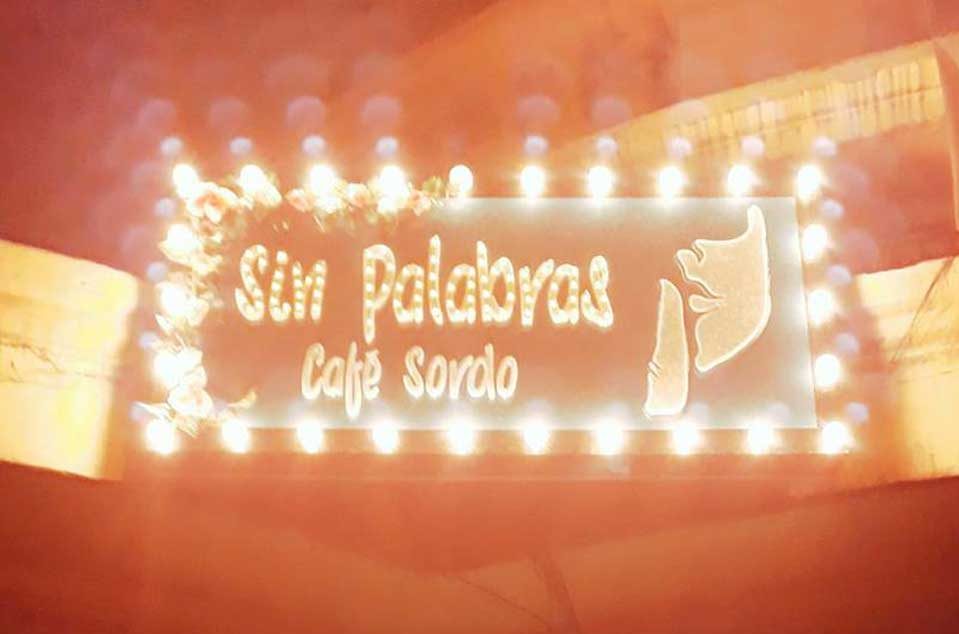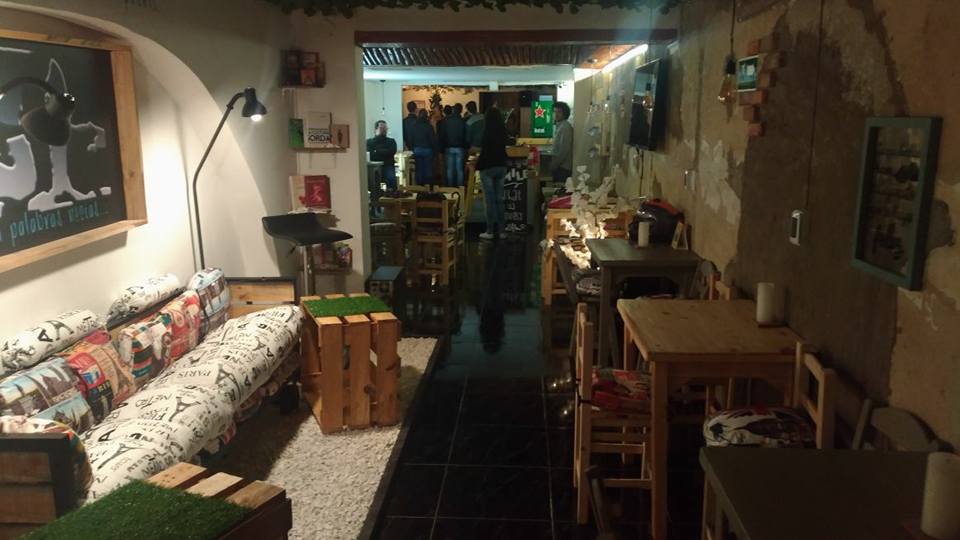
Sin Palabras is a new space for the capital’s deaf community to meet, enjoy a beer and get to know new people.
Sin Palabras is a new café-bar on the Séptima, and the first one in the country designed to meet the needs of the city’s deaf community.
On a crisp Bogotá night, I’m out with some friends. We step into an oddly lit for a bar. Intrigued, we venture further in. There are tables filled with people communicating in sign language. Mmmm, we think, probably not the place for a group of speakers to enter. But, we’re gently waved in by one of the waiters and so we stay. Welcome to Sin Palabras, the first café-bar of its kind in Colombia and one of very few in the world designed for deaf people.
We spent a few hours there – basically gossiping (not in sign language, which would be a wonderful skill to have) – and I came back a couple of weeks later for a chat with bar owners María Fernanda Vanegas, Christian Melo and Jessica Mojica.
Christian says that our initial stay-or-go quandary is precisely the challenge they want us to face – in a way, to put hearing people into the situation deaf people have been facing their entire lives. “They have to go to a bar, and not only a bar, a hairdresser, a butcher’s shop, a bakery and communicate with them however they can. If they do not have an interpreter they cannot order and they will not be understood.”
He continues, “Basically our main objective is that hearing people adapt to the deaf and not the other way around, which is what has always been the case.”
They have to go to a bar, and not only a bar, a hairdresser, a butcher’s shop, a bakery, and communicate with them however they can, and if they do not have an interpreter they cannot order and they will not be understood.”
– Christian Melo, Co-owner
His sister, María Fernanda, jumps in enthusiastically. She says that hearing people often leave the bar fearing that communication is not going to be effective. She invites them instead to leave their comfort zones, come into the bar and change their perspective. She goes on to say Sin Palabras is a place that has been sensorially and socially adapted for the deaf community, but that “everybody is welcome; hearing people, deaf people, no matter their religion, sexual orientation or political ideology.”
It’s a fantastic space and it’s totally kitted out to meet the needs of both deaf and hearing guests. There’s a special wooden floor that vibrates so that patrons can feel the music. A signed interpretation of Manuel Medrano’s latest song plays in the background as we speak – another of the adaptations are TV screens which reproduce English and Spanish sign language versions of the latest hits.
There are also booklets designed for the hearing community to show them how to have basic interactions with the staff at the bar like saying hello and thank you, asking for the menu, toilet or the smoking area, or signing your ABC. Each table has a light bulb overhead with a switch, which can be used to call the waiter.
Christian is outspoken about the importance of everybody learning to sign. In fact, he believes people should learn sign language before learning a second spoken language because he says first and foremost they need to communicate with the people they live with. “I wouldn’t be able to help it if my son was born deaf tomorrow, or if my sister falls in love with a deaf person and I’ll have to communicate with them.”
He has a lot of interesting facts about the deaf community in Bogotá. “People tend to think of them as a minority, but it is a minority in the high numbers,” he says, telling us that a surprisingly high proportion of the population in Bogotá have hearing difficulties. Although some can speak or write some Spanish (and so have some access to the hearing world), the grammar structure of sign language is nothing like the spoken languages we know and not all of them know Spanish.
A waiter comes with our blackberry and mango juices, and we learn the signs for “thank you” and “you’re welcome.” As we sip our non-alcoholic drinks, María Fernanda explains a little bit more about the research they conducted before this project saw the light of day. They got most of their data from INSOR and FENASCOL, and from some universities. They also started learning Colombian sign language; they know they have not reached an advanced level, but they keep on learning. After they set up the company, Sin Palabras received over 254 CVs for six waiter posts.
He explains that it is important to understand that deaf people do not see their deafness as a disability, but as a condition – and one that some are proud of. We have to understand that they are as capable as anyone else he says. “They say, ‘We are just as capable as hearing people, many of us are professionals and specialists, with Master’s degrees and Doctorates.’” Also, there are different kinds of deaf: those who are born with the condition, people who have lost their hearing with time, those who became deaf because of an accident, and CODA, the hearing children of deaf parents who learn sign language, and become part of the community.
Christian came up with the idea for this innovative bar while he was studying Transport Technology Logistics at SENA. He saw a couple communicating in sign language and wondered where the deaf community would go for a beer, to have a sandwich, just to hang out. His wife, Jessica, was a little afraid of the idea as they did not know what it was they were going to do with it. And so they started investigating, and his sister, María Fernanda, a social communicator, did the first and most important thing: she started learning the language. Christian says the bar is being a big success with the community; people come all the way from Soacha or Suba to spend time at the bar.
“Are there other places like Sin Palabras that you know of?” I ask Christian. “Yes, there are four more; one in England, one in Canada, one in Mexico and one in Nicaragua, the Café de las Sonrisas. We also have plans to expand; we’d like to open one in Medellín, then maybe Cali, and then, why not, go international, Argentina, Spain.”
The trio are not only ambitious in terms of their expansion plans. María Fernanda and Christian, who are currently studying Social Communication and Business Intelligence Projects Management at Politécnico Grancolombiano, respectively, also want to change society – to push for more people to learn sign language. The partners would like to see a bill pass through parliament that makes it compulsory for students to learn Colombian sign language. “It would be great if we had that bill pass,” says Christian.
Sin Palabras is open from Monday through Sunday. There is story-telling on Saturdays at 9pm, in sign language of course, but accompanied by an interpreter. Christian says they want to aim at offering different cultural activities, besides the drinks and food; they want to offer sensations. They have a mini-library with books on deaf culture, and board games for people to borrow and play at the bar.
Address: Carrera 7 #57-47
Opening hours: Mon-Wed: 8am-11pm, Thu-Sat: 8am-2am, Sun: 9am-6pm
By Ángela Forero-Aponte






